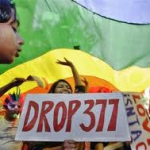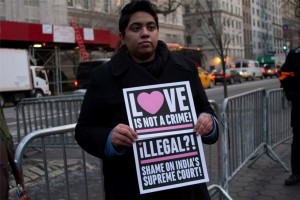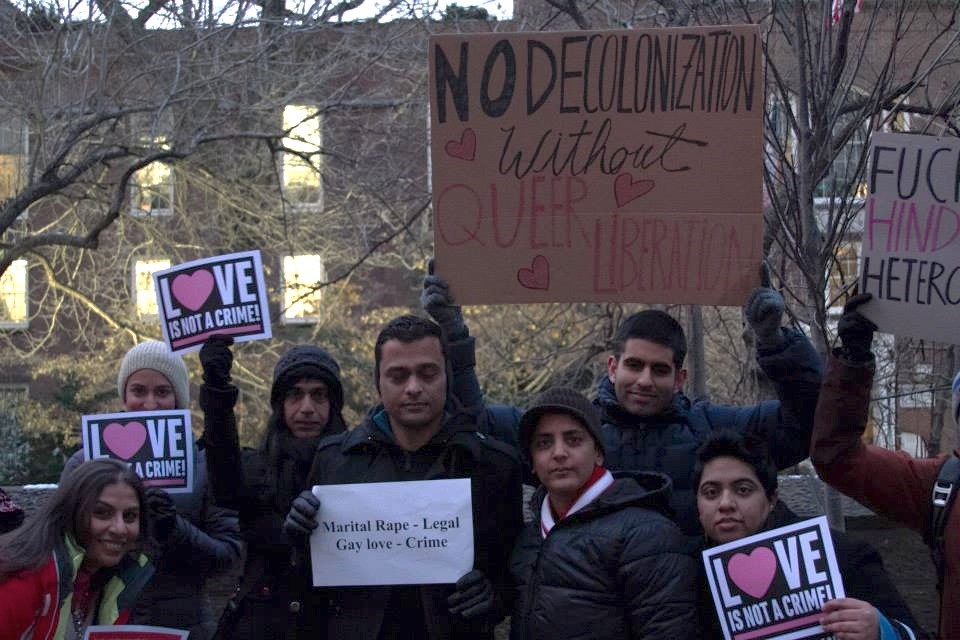 As I walked to the Indian Consulate on the Upper East Side Wednesday evening, the chills I felt through my body had little to do with the brisk NYC weather. My heart was racing, slowly building in tempo since the stroke of midnight — the exact moment I heard that India’s Supreme Court had upheld Section 377 of the Indian Penal Code, reversing the 2009 Delhi High Court decision and in essence re-criminalizing homosexuality. A million emotions and questions were swirling in my head, and I had no idea what to expect. I was enraged, deflated, hopeless, sad, angry, and hurt. What does this mean for the millions of LGBTQ people in India? How do we move forward as activists, as Indian citizens, as human beings? How does one even begin to deal with unspeakable tragedy at the hand of oppression?
As I walked to the Indian Consulate on the Upper East Side Wednesday evening, the chills I felt through my body had little to do with the brisk NYC weather. My heart was racing, slowly building in tempo since the stroke of midnight — the exact moment I heard that India’s Supreme Court had upheld Section 377 of the Indian Penal Code, reversing the 2009 Delhi High Court decision and in essence re-criminalizing homosexuality. A million emotions and questions were swirling in my head, and I had no idea what to expect. I was enraged, deflated, hopeless, sad, angry, and hurt. What does this mean for the millions of LGBTQ people in India? How do we move forward as activists, as Indian citizens, as human beings? How does one even begin to deal with unspeakable tragedy at the hand of oppression?

We spent the day consoling each other from miles and continents and computer screens apart, sharing messages of unity, empathy, and solidarity. The passion with which the rally so organically came to be was a beautiful thing to watch unfold in the social media age we live in. Mere hours later, we gathered down the street from the Indian Consulate, surrounded by NYPD officers and barricades, and looked to one another with hope. Slowly, signs were made, chants were recited, and powerful poetry was released into the universe. What I witnessed at the rally was a community in pain, coming together not merely because we need visibility and calls for action, but also because we all had no idea where to go to heal, if not in the comfort of one another. [pullquote align=”right”]It’s a bumpy crash landing to be so gut-wrenchingly rejected as a human being.[/pullquote]
Coming right on the heels of our DOMA and Prop 8 victories here in the U.S., it’s incredibly difficult to verbalize what it feels like to once again be punished and ostracized by a country I consider my motherland. It’s easy to take our privilege in this country for granted, and on such a historically significant day, it’s a bumpy crash landing to be so gut-wrenchingly rejected as a human being. When fundamental rights are being withheld, all other day-to-day struggles seem futile and minute.
In less than a month, I will return to India after seven years, visiting Mumbai, Kochi, and Trivandrum — cities I’ve never been to before — with 25 non-Indian peers for a study abroad course on higher education. I thought briefly of how people in India would react to a queer NRI woman with a faux-hawk, and that fear lingers in the wake of recent developments for different reasons. I have the right and privilege to be myself in New York City, among friends and chosen family. I am not afraid to walk the streets of India as the person I am meant to be. Instead, I am sad to return to my country knowing that who I am is not only unaccepted but also resoundingly rejected.
One of the greatest driving forces for my work, research, and advocacy has always been helping and reaching the adolescent population. I imagine a young 12- or 13-year-old child in a small city in India who has just begun to realize or voice that they feel different, or has a big crush on their same-sex best friend, and then sees and hears that their government believes those thoughts and desires make them a criminal. At the New York rally against Section 377, we danced, cheered, sang “Hum Honge Kamyaab (We Shall Overcome)” and chanted “377 murdabad murdabad, queer liberation zindabad, zindabad.” I closed my eyes and thought of that young child and countless others just like them. In our own healing process, I hoped that somehow, the universe would send positive energy to my motherland, and all her children that are in pain today and will be for a long time.

[pullquote align=”right”]I am proud to stand with my community in solidarity against yesterday’s ruling.[/pullquote]It is a tragic day for our community, and it feels like I am grieving the betrayal and loss of a loved one. I know that my journey as an advocate will find renewed strength in the face of incredible adversity, but first, I must find a way to heal. Hearing from, speaking to, and standing with my friends and chosen family after the ruling, I was reminded that we have roots that connect us to one another as human beings across all barriers of time, distance, gender, ethnicity, and more. I am proud to stand with my community in solidarity against Wednesday’s ruling. As we help one another heal, may we gather the strength to build a better future for generations of Indians to come.
Priya Arora is a graduate student at New York University, studying Human Development and Social Intervention with a research focus on mental health in LGBTQ youths. Born and raised in California, Priya has found a home in New York, and hopes to go on to become a mental health counselor. Follow her on Twitter at @thepriyaarora.












